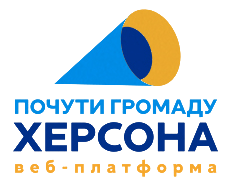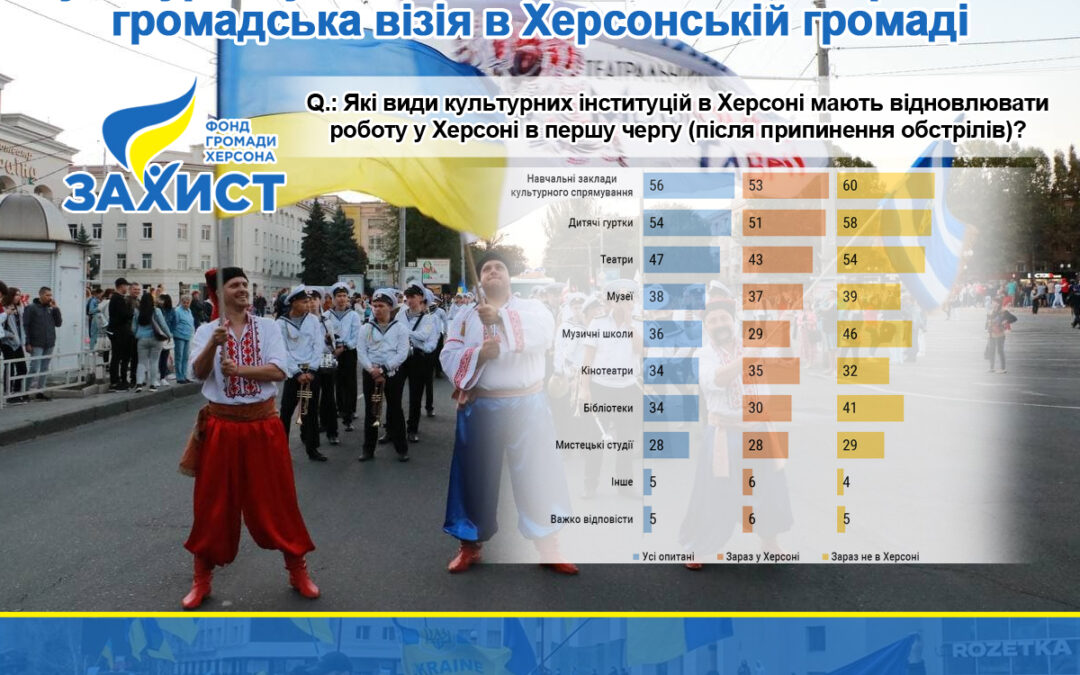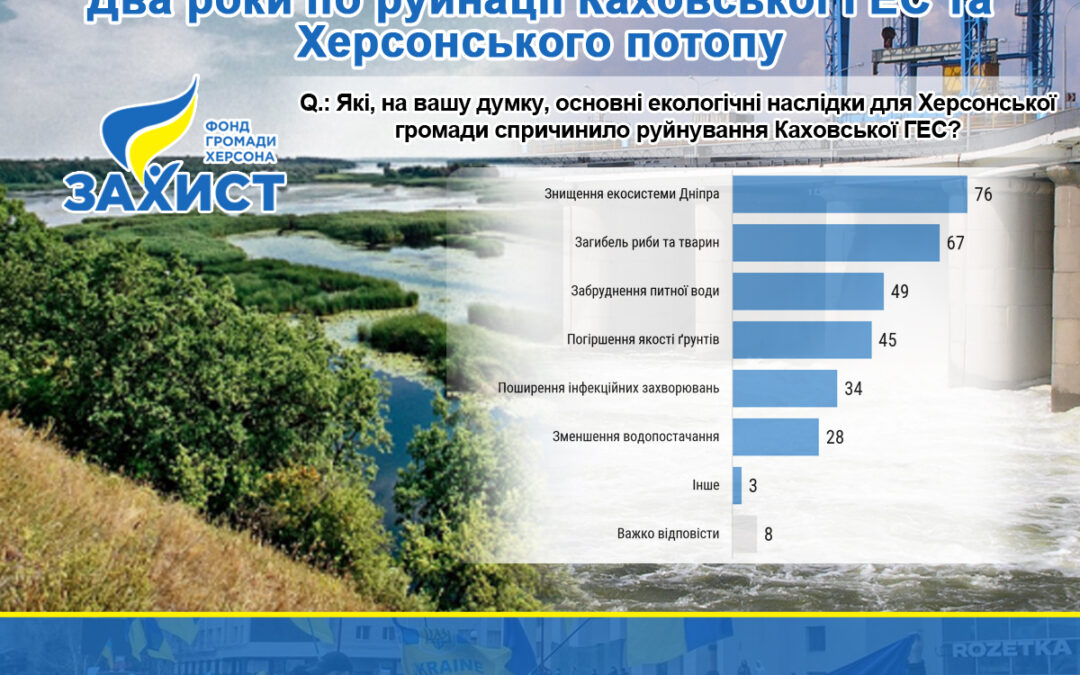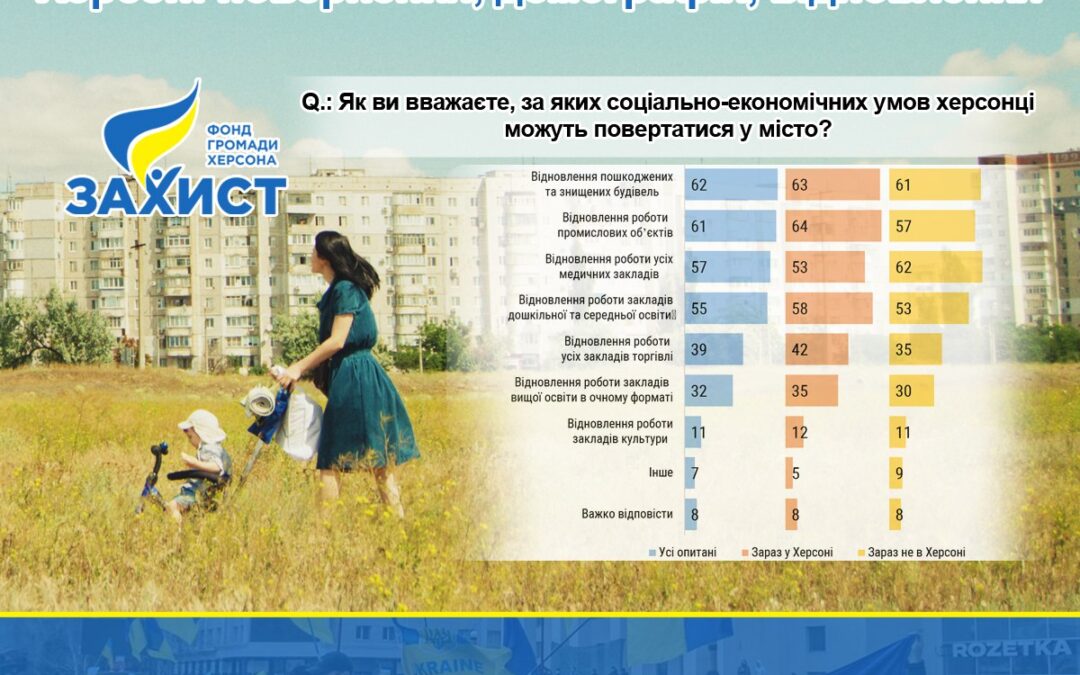Methodology: an online survey using an interactive structured questionnaire, a relevant link was sent to potential respondents from the database (online research panel of the Kherson community). The sample is based on demographic indicators as of January 1, 2022. Given the indicators, the research margin of error does not exceed 5%, with a probability of 0.95. The sample included Kherson residents both currently residing within the community and those who left Kherson after February 24, 2022, to other regions of Ukraine or abroad. Currently, there is no official data on Kherson’s residents’ migration, so it is not possible to assess the given respondent sample representativity. However, there are reasons to believe that the ratio of respondents still residing within the community presented is greater than de facto one, which may affect the research results. Research objective: to find out the attitude of Kherson residents toward the prospects of returning to the community and identify preventing factors.
Sample size: 404 respondents.
Research client: Community Foundation of Kherson “Zakhyst”.
Key Outputs
1.96% of respondents have close people who fled Kherson after February 24, 2022.
2.More than half of all respondents (51%) believe that driving the enemy a significant distance away from the city is a sufficient condition to return. This opinion is less popular (46%) among those not residing in Kherson than among current Kherson residents (55%). Another condition in terms of its supporters is the return of Ukrainian control over the territories it had as of 2022, that is, before the full-scale invasion launched by the Russian Federation. There is a major difference in the popularity of this factor among different respondents: it is supported by 35% of those who fled, and by only 19% of those who stayed.
3.All respondents claimed the following as the most important social and economic factors of return: opening medical institutions (69%), industrial facilities (64%), rebuilding damaged and destroyed property (63%), renewal of pre-school and secondary education institutions functioning in a classroom format (60%). It can be stated that opening various institutions is more important for those not residing in Kherson than for those who stayed. The biggest difference is observed concerning opening medical institutions (80% to 60%), educational establishments (64% to 57%), and retail sales
facilities (58% to 42%).
4.Most respondents believe that 50% to 80% of Kherson residents will return to the city when bombing stops (65% of responses).
5.The respondents are even more optimistic about the return of the population if Ukraine restores control over its 1991 borders. Thus, 81% believe that from 60% to 100% of Kherson residents will then return.
6.The next question concerns the respondents personal opinion on whether it is worth returning to Kherson if the bombing stops. In total, there were 79% positive answers (32% yes, 47% rather yes).
7.The respondents noted the following as their main reasons to return: housing and other real estate (89%), relatives (63%), no fear of renewed hostilities (60%), difficulties in adapting to a new place (44%), and employment (43%). That said, for those not residing in Kherson, housing is even more important (96% compared to 83% of current residents), as well as such emotional factors like pleasant memories (26%) and friends (24%).
8.The major reason for not returning to Kherson is the fear of hostilities being renewed (72% in total). The next reasons are: successful adaptation to the new place (68%), prospects for children or relatives (59%), a new job (52%), and new housing in the current place of residence (49%). It is worth noting that those who stayed in Kherson sometimes rate factors related to life as an emigrant higher than those not residing in Kherson. For example, successful adaptation (70% to 66%), prospects for children and relatives (64% to 53%), and a new job (54% to 49%). The most notable difference
between the two groups is the fear of hostilities being renewed (82% of those who fled, 63% of those who stayed in Kherson).
9.More than half (56%) of the respondents claimed that all or most of their relatives are going to return to Kherson. 21% answered that only a few of their relatives are considering returning.
10.Among 182 respondents not residing in Kherson, 56% are planning to return, and 24% are somewhat planning. 20% are not planning or could not answer. The reasons for not returning were fear, successful adaptation in the new place, prospects for children, a new job, and housing.
You can read the full report by downloading it or read it in Ukrainian.
This research was conducted by the Zakhyst Kherson Community Foundation Charitable Organization as a part of its project implemented under the USAID/ENGAGE activity, which is funded by the United States Agency for International Development (USAID) and implemented by Pact. The consents of this research are the sole responsibility of Pact and its implementing partners and do not necessary reflect the views of USAID or the United States Government/
Reproducing and using any part of this product in any format, including graphic and electronic, copying or any other usage is suitable to reference to the sourc/




